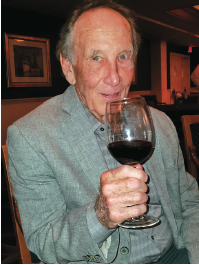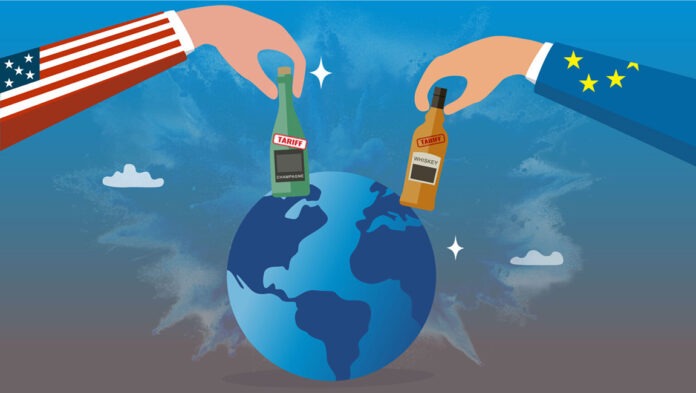S.W AND RICH HERMANSEN
Staff Writers
wine@lbknews.com
Donald Trump is playing the role of the Queen of Hearts in the Alice in Wonderland revival now in its sixth month on the world stage. The Queen in this act is sitting in judgment of lesser beings. In this drama as staged by Donald himself, the lower ranks tremble before the Queen who when displeased by their balking at bad deals commands “Off with their heads!”.
month on the world stage. The Queen in this act is sitting in judgment of lesser beings. In this drama as staged by Donald himself, the lower ranks tremble before the Queen who when displeased by their balking at bad deals commands “Off with their heads!”.
Judging from the drama over tariffs on US whiskey and European wine, one would think that the fate of the US economy depends on favorable terms of trade in these commodities. Nothing could be farther from the truth. Joseph Stiglitz, a US economist and Nobel laureate in economics, estimates that the exports of products manufactured in the USA account for ten percent or less of international trade. Imports and exports of alcoholic beverages account for a small percentage of that ten percent. Even so, the Canadians and Europeans know that whiskey exports have special importance to states that supported Trump in the 2024 election, especially Kentucky and Tennessee. The Trump administration knows that small producers of wine grapes and wine in Italy, France, Spain, Portugal, Germany, Greece, and other countries in the EU will suffer disproportionately under high tariffs on exports to the US, and that beer-drinking Midwesterners and religious right voters who helped elect Trump are not buying imported wines and would thus not bear any burden of higher prices. This show of dominance fits into the Make America Great Again and America First themes. Yet cracks in Republican support for Trump’s tariff initiatives suggest that tariffs on commodities will be not only peripheral but also transitory in their impact on the US economy. Services play a more important role on the US side of international trade and China for one knows that and even is threatening to retaliate against Trump’s tariffs in part by further restricting showing of Hollywood movies.
Tariff negotiations between the EU and the US have not reached a conclusion on alcoholic beverages at the time of the writing of this article. A general agreement on a fifteen percent tariff, down from a threatened thirty percent, leaves in this Let’s Make a Deal negotiation a possible exception for agricultural products. It seems unlikely, though, given the political environment described earlier and the background of the tariffs on wine imposed by the earlier Trump administration, that EU alcoholic beverages, largely wine, will escape the default fifteen percent rate. The early impact of tariffs has everyone on tenterhooks.
What will a fifteen percent tariff mean for US buyers of wine imported from the EU? The Trump administration wishfully claiming that EU businesses that have been taking advantage of the US will eat the tariff by lowering export prices to hold the cost of wine imports at the same level as before the tariff. Proceeds from tariffs will shift some of the US tax burden to someone else, realizing the dream of conservative Republicans and some Democrats in Congress.
Another Nobel Laureate US economist, Paul Krugman, a New York Times columnist and a SubStack podcaster who presents empirical evidence for his claims, compares export prices of commodities already subject to tariffs and shows that instead of eating tariffs, exporters have raised export prices and passed these increases on to US importers. In these cases, US businesses and consumers are shouldering some the burden of tariffs in the short-run, but exporters will have to raise prices further in the longer-run. Bottom line: no such thing as a free lunch.
The evident deep understanding of economic reality in the statements of Stiglitz and Krugman contrast with the off the cuff claims of Trump and the wacky “tariff formula” credited to Trump’s trade advisor, Peter Navarro. The “formula” includes two parameters in Greek letters that offset one another and have no role in its value of the alleged trade imbalance for a specific country. Widely ridiculed by economists, including Keven Corinth and Stan Veuger of the ultraconservative American Enterprise Institute, Navarro denies a role in specifying the formula. (Navarro spent four months in federal prison for Contempt of Congress, but from the tone of economists’ reactions to his recent role should have a life sentence for Contempt of Economics.)
The quiet and truthful discussions by leading economists of economic issues deserve more attention. A friend, the late, lamented Ed Kane of Boston College, Ohio State University, and the National Bureau of Economic Research and a graduate of the same MIT doctoral program as Stiglitz and Krugman, said that the great teachers of economics know how to simplify the subject without distorting it. Bottom line: listen to the scholars and ignore the propogandists.
S. W. Hermansen has used his expertise in econometrics, data science and epidemiology to help develop research databases for the Pentagon, the National Institutes of Health, the Department of Agriculture, and Health Resources and Services. He has visited premier vineyards and taste wines from major appellations in California, Oregon, New York State, and internationally from Tuscany and the Piedmont in Italy, the Ribera del Duero in Spain, the Barossa Valley and McLaren Vale in Australia, and the Otego Valley in New Zealand. Currently he splits time between residences in Chevy Chase, Maryland and St. Armand’s Circle in Florida.
Rich Hermansen selected has first wine list for a restaurant shortly after graduating from college with a degree in Mathematics. He has extensive service and management experience in the food and wine industry. Family and friends rate him as their favorite chef, bartender, and wine steward. He lives in Severna Park, Maryland.

